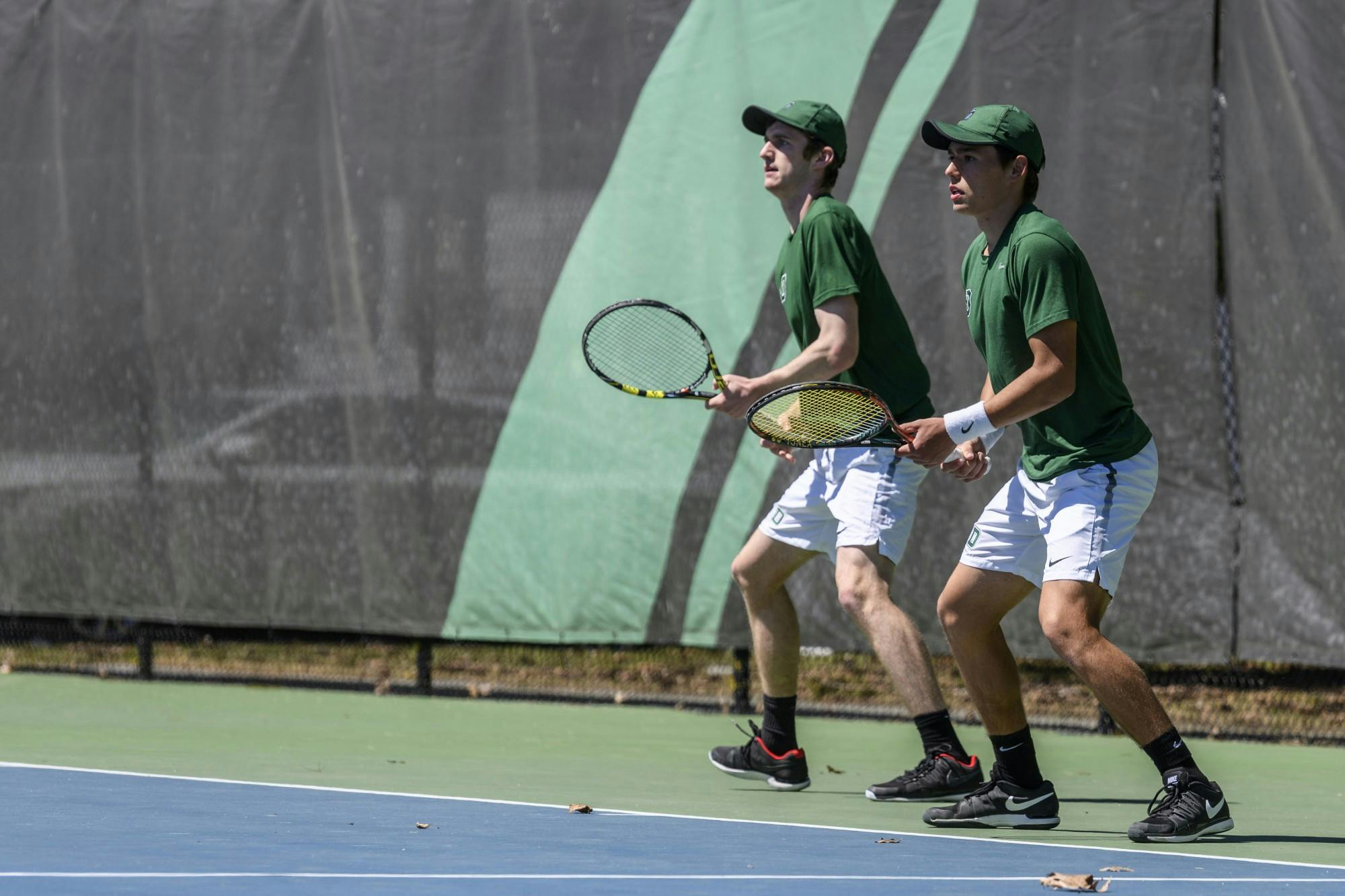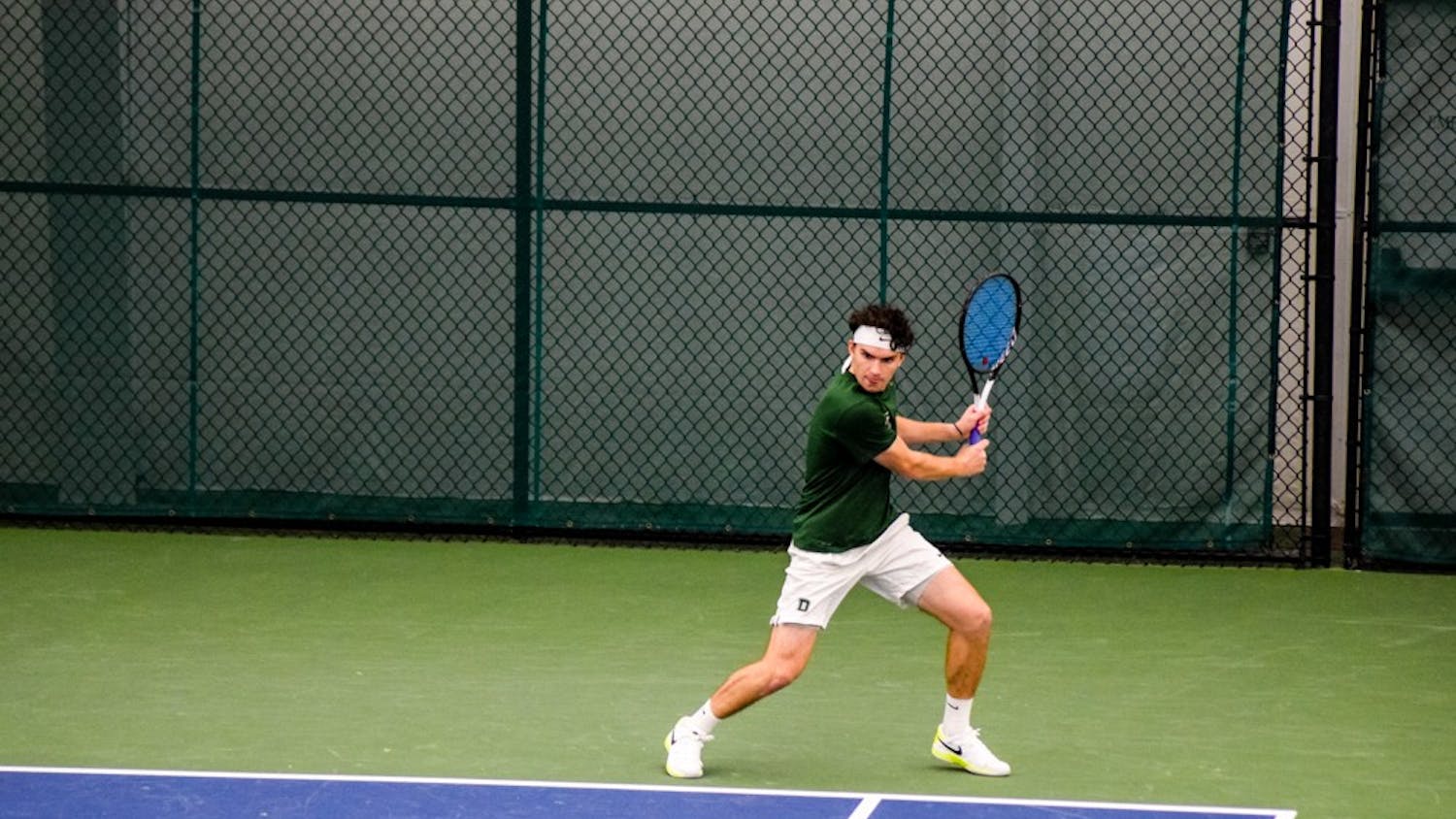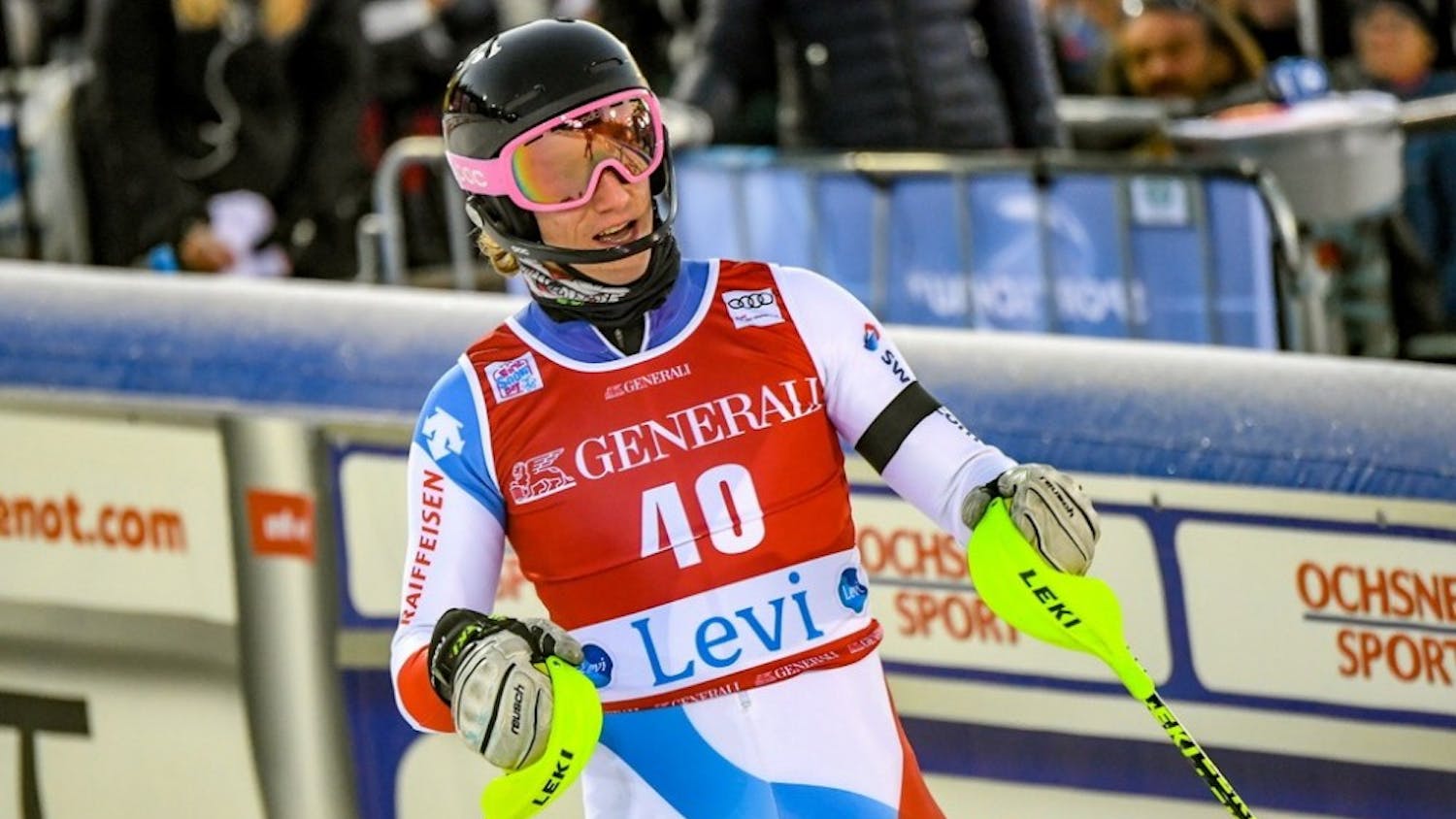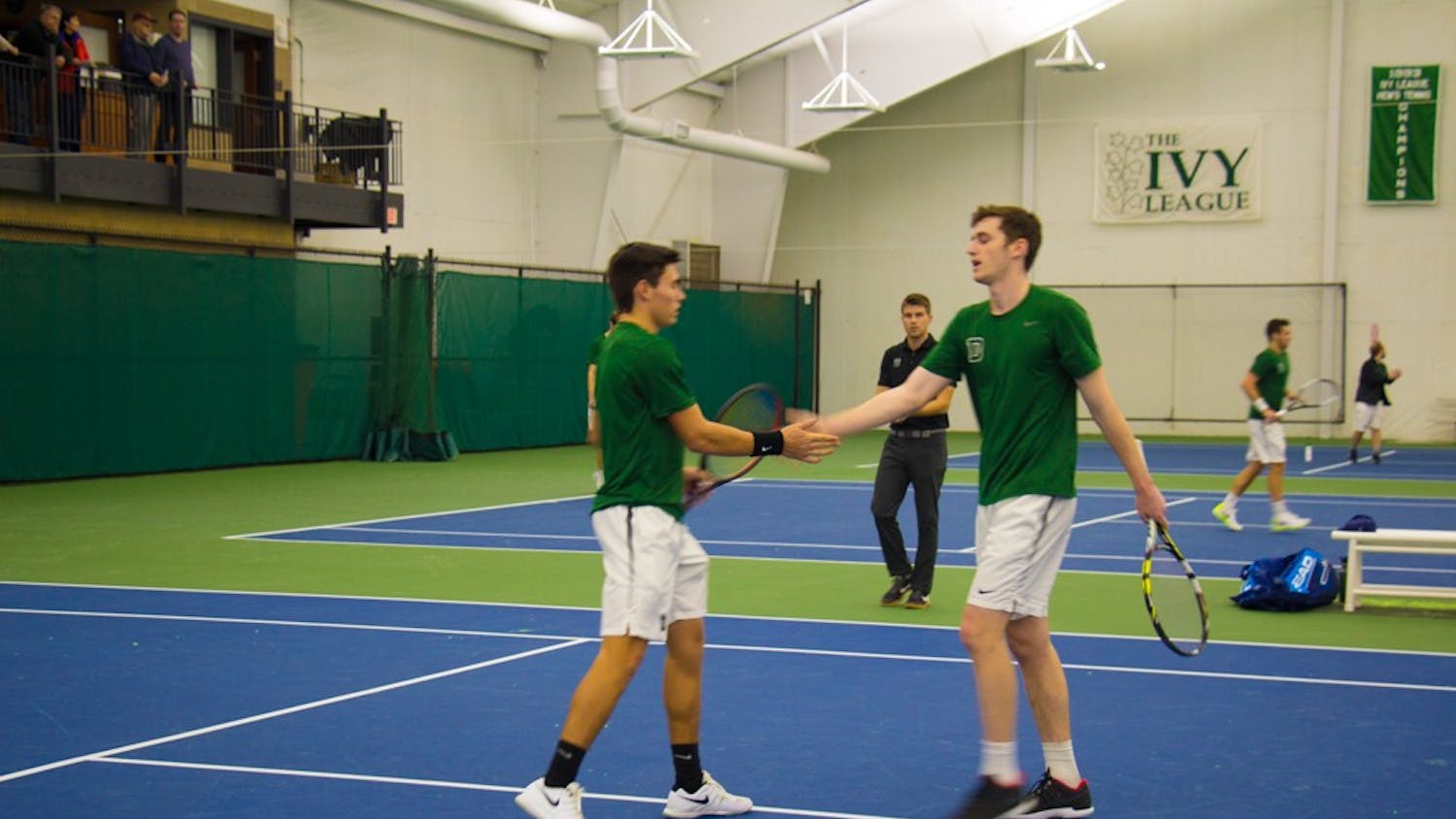Behind Dartmouth men’s tennis’s return to national prominence over the last few years are two players: Charlie Broom ’20 and David Horneffer ’20. Their accomplishments span both the tennis court and the classroom. With a combined four All-Ivy First Team singles awards, two NCAA tournament appearances in doubles and a career-high doubles national ranking of No. 7, the duo have been the face of the program for the last three years.
While both had success in singles — with Broom playing at the No. 1 spot since the end of his freshman year and Horneffer rotating between No. 2 and No. 3 — they reached their highest position on a national scale in doubles. The two were matched together at the No. 1 doubles spot during their sophomore year and quickly carved out a presence within the Ivy League. The duo went undefeated in Ivy League play that season and were a major factor behind Dartmouth’s 2018 Ivy League Championship. The following year, the team spent most of the season ranked in the national polls and earned the Big Green’s first automatic NCAA Tournament bid since 1976.
The duo was poised to return to the NCAA tournament this spring. Before the season’s untimely end, Broom and Horneffer were featured again in the national rankings. They were looking to return to Ivy League dominance, but the chance to play for another title never arrived.
“For the last 10 years, Dartmouth has been on a real upward trajectory, and if you were just to look at our results, you’d see a team that had been knocking on the door of making the NCAA tournament, a team that had been knocking on the door of winning an Ivy league title [and] a team that had been knocking on the door of a top-thirty ranking,” coach Xander Centenari ’13 said. “When these guys came in, it was like that door was busted open.”
Both Broom and Horneffer said that they have been playing tennis since they could walk. For both players, tennis is a family affair. Both of Horneffer’s parents played tennis, so he was out on the courts at a young age, balancing the game with other sports until he committed fully to tennis in high school. Meanwhile, Broom played with his siblings on courts just yards away from his home.
Growing up in the United Kingdom, Broom juggled soccer and tennis for a period until he began to focus on tennis around age 11 and started playing in international tournaments. At only 17 years old, Broom played at Junior Wimbledon after qualifying through a wild card.
“From 11 to 17 or 18, it was progressing through the junior tournaments and playing abroad,” Broom said. “It got to the point where I was deciding whether to go pro or to go to college and get a degree.”
Broom said that he received an offer from Dartmouth toward the end of his recruitment process and fell in love with the campus and the people. Horneffer said much of the same about his recruitment process.
“When I visited I fell in love with the place,” Horneffer said. “It was a really easy choice.”
The transition to Dartmouth, particularly with the demands of being a student-athlete, can be difficult, and both players dealt with it differently. Broom said that he struggled with balancing hours of lectures with training everyday, while Horneffer added that he struggled with the academic transition.
“The transition from a public school to Dartmouth wasn’t really that easy, and I think a lot of older guys on the team helped show me how people study at Dartmouth and what to expect in certain classes,” Horneffer said. “Tennis-wise, college tennis was really a jump up … I liked playing in a team environment, being pushed every day with a group of guys.”
Though both players were successful throughout their freshman year, they did not become a doubles pair until their sophomore winter.
“It was just a natural fit,” Broom said. “Our games complement each other well: He’s got a bigger serve [and] bigger ground strokes, and with the way I return, I can keep us in return games as much as possible.”
The chemistry of a doubles team is vital for their success, and being the only two ’20s on the roster, Broom and Horneffer clicked.
“[Chemistry is] a key factor of any doubles partnership,” Broom said. “You can bounce off each other, and when things are tough or someone’s not playing well, you have the trust that you’re going to get through it. I always felt that with [Horneffer].”
Though he only had the chance to coach them for their senior year, Centenari had nothing but praise for the doubles team.
“They have similar mindsets about improvement and getting better, and they have been mirroring that with each other which makes the team better,” Centenari said. “Their confidence grew over time, and they began believing in themselves more and more as time went on.”
Both Broom and Horneffer said that their most memorable moment with the team was during a match against Texas Tech University at their junior year spring break tournament at Rice University.
“We played Texas Tech away at Rice during an invitational tournament, and [their No. 1 doubles team was] ranked top 10 in the country,” Broom said. “We both played really, really well, and we ended up winning … We made NCAAs last year as well. [Those were] a couple of milestone achievements, and I was really happy that I was able to experience that with him.”
Their talent is not their only shining spot, however. For one, the duo set an example of academic excellence through their management of challenging course loads, as Broom majored in biological chemistry and Horneffer majored in economics. Their leadership was evident on and off the court, as well as in the many ways they have inspired younger players. Pierce Widdecombe ’22 cited their unparalleled commitment to the team.
“They got the results on the court and worked really well together, leading by example of what we want the program to look like and what we need to do,” Widdecombe said. “They were in quite a unique position because we didn’t have any seniors on the team my freshman year, and they were juniors. They had to step up to those roles a year earlier than might have been expected, and they did a really good job of it.”
Centenari agreed with Widdecombe’s sentiment and emphasized the impact that Broom and Horneffer have had on the program.
“Both these guys were very self-sufficient,” Centenari said. “They came in with a sense of maturity knowing what they both wanted and what they both needed. It showed the rest of the guys a standard of self-belief and a standard of confidence that helped raise this program further over the last four years.”
Moving forward, Horneffer said that he will be leaving competitive tennis behind. Broom, however, will forge further into the world of professional tennis, playing at an academy in London and competing in other tournaments around the world.
Even though their time at Dartmouth has ended, Broom and Horneffer will keep the program in their hearts.
“I met a lot of my closest friends at Dartmouth through the team,” Horneffer said. “We spend so much time together that you get to know people super well, and I think going through the whole process of working toward a team goal is rewarding. I think it definitely brought me some of my best memories.”




